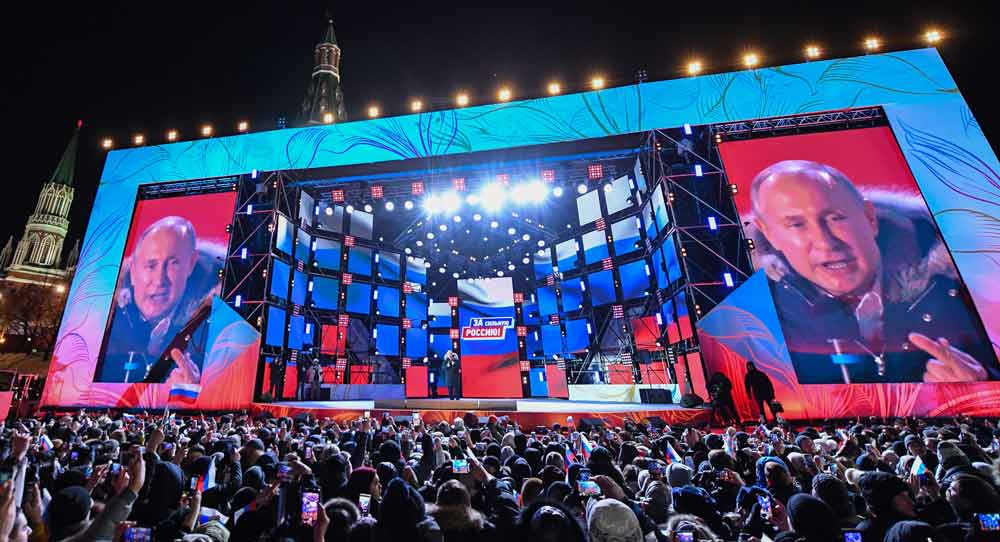Vladimir Putin’s predictable election victory has the potential of dividing the European Union and weakening the transatlantic relationship.
Although the EU has, against all the odds, kept rolling over the sanctions on Russia after Putin’s annexation of Crimea four years ago this month, several EU leaders and political parties are, to say the least, ambiguous about Putin.
From Hungary’s Prime Minister Viktor Orbán to the UK’s Labour Party opposition leader Jeremy Corbyn to Horst Seehofer, the former leader of Bavaria and now interior minister in Chancellor Angela Merkel’s fourth coalition government—they have all pandered to Putin.
Whether through state visits by Putin to Hungary or Orbán to Moscow, or Seehofer rolling out the red carpet for his Hungarian pal in Munich or popping over to see Putin in the Kremlin, and now Italy’s Northern League joining in, Putin has been able to tap into residual pro-Russian sentiment in several EU countries.
The Kremlin has been adept at using social media and the plethora of ways it sows disinformation, no thanks to the slowness of EU governments to respond. And this disinformation campaign is likely to continue in ways that might persuade some EU leaders to argue that it’s time to move on with Russia, especially given the state of the transatlantic ties under U.S. President Donald Trump. Indeed, a recent opinion poll published by ZDF, Germany’s second public television channel showed that 78 percent of Germans were “very concerned” about Trump’s policies; only 58 percent were worried about Putin’s, while 40 percent were not worried about the politics of the Russian president.
In other words, the temptation to rebuild the relationship with Russia is being juxtaposed with growing frustration by European leaders over how Trump runs America. For some EU leaders the style of governing in the White House is at the expense of strengthening transatlantic ties. Yet those ties are more necessary than ever given China’s growing economic and political clout and Russia’s increasingly disruptive role.That is why Peter Altmaier, one of Merkel’s trusted aides and Germany’s current economy minister, travelled to Washington to try to persuade the White House to drop its tariffs on steel and aluminum imports.
These tariffs would have a negative impact on German car exports to the United States, even though Germany’s big automobile manufacturers are expanding their U.S. production plants as Trump pushes his “America First” agenda.
Above all, Germany does not want the United States to abandon free trade and retreat to protectionism. That would scare Berlin. It’s not just because of Germany’s immense trade surplus that is so often criticized by Washington. It’s because German foreign policy, since the late 1940s, has been anchored on multilateralism. And that includes NATO, even if a persistent German pacifism bridles at this military organization. It is multilateralism that has given Germany the questionable luxury of not having to act and think strategically. Whether Berlin realizes it or not, it is a luxury that is fast running its course.
Given what is happening in Russia and the United States, Germany’s handling of both countries is pivotal for the EU, for NATO, and for the economic and political underpinnings of the West. Apart from the big question about how Berlin and Paris can move the EU forward, the two urgent items waiting in Merkel’s in-tray are Russia and the United States.
Since 2014, the EU’s strategy toward Russia was punitive as far as EU leaders could agree on the level of the sanctions. But with Putin reelected for another six years, Merkel and French President Emmanuel Macron have to act together in two ways.
First, they need a double-pronged strategy toward Ukraine. One involves exerting maximum pressure on President Petro Poroshenko to continue with reforms. The big EU countries have often been too indulgent with Kiev. Just because Ukraine is heading into an election in 2019 is no excuse for the government and presidential administration to stall on reforms. The EU has to keep focused on the vulnerability (and potential) of Ukraine. Wavering by the EU will benefit the Kremlin, which does not want its Western neighbor to turn into a success story. Wavering by the EU could also lead to instability along its Eastern border. Does the EU want another flow of refugees?
The second prong must be focused on how to break the deadlock over the Minsk Accords, in particular how to reintegrate the Donbas.
Merkel’s other in-box item in the context of “Putin at the helm” is NATO.
The focus on NATO countries spending 2 percent of GDP on defense is a distraction, if not a red herring. But if it pleases Trump—and allows him to boast that all is cajoling paid off—so be it.
Of much more importance is NATO’s ability to be resilient when it comes to dealing with cyberattacks, especially protecting critical infrastructure such as energy grids, hospitals, transportation, and the internet. Indeed, the recent use of a chemical weapon against the former double agent Sergei Skripal and his daughter Yulia exposed the shortcomings of the UK’s resilience. Surely, this means NATO working much more closely with the EU. And were that relationship really to move forward, it would make it more difficult for Putin to use his next six years in office to weaken both organizations.






